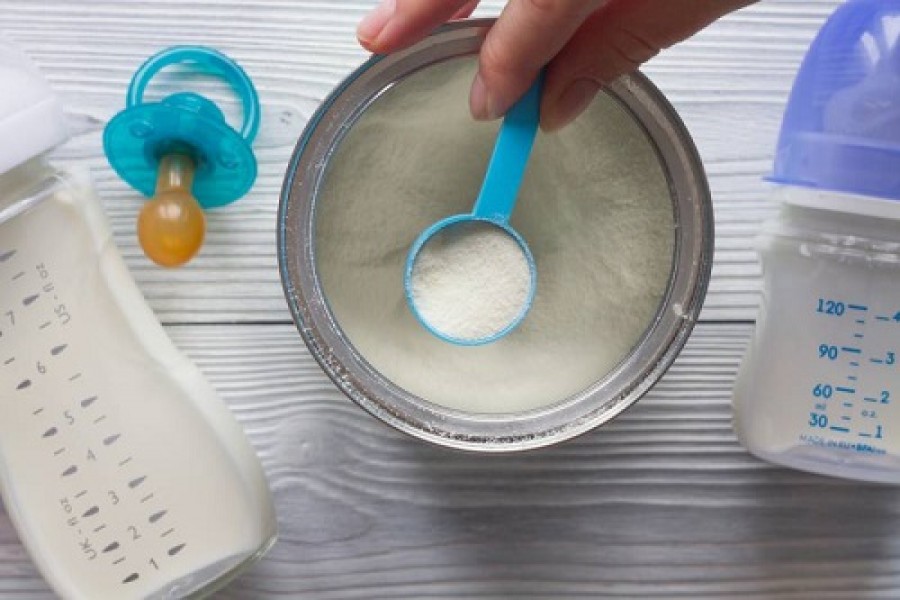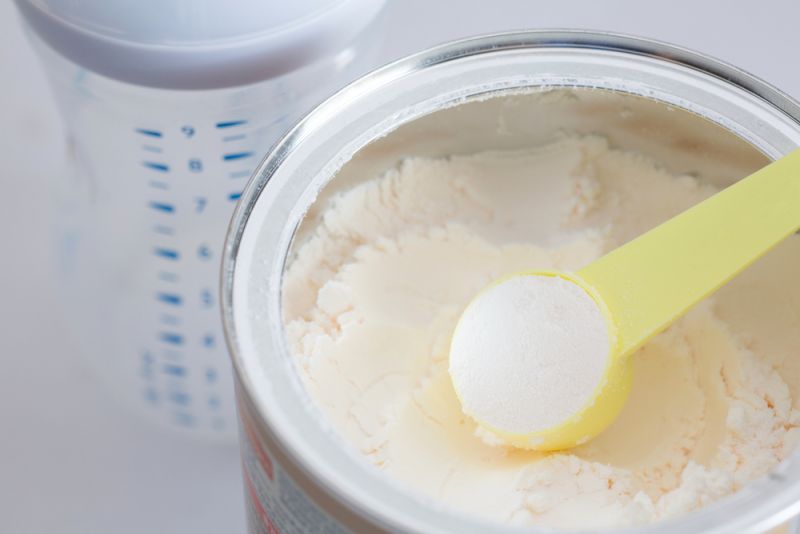Goat’s Milk Formula Versus Cow’s Milk Formula

Breastmilk is the normal food for human babies.
It is completely natural and is precisely designed to perfectly meet your bub’s every nutritional need.
Unfortunately, breastfeeding is not always possible!
If you are unable to provide your baby with breastmilk either directly from the breast, with pumped milk, or with donor milk, you will need to substitute it with an infant formula.
Breastmilk and infant formula are the only acceptable and safe options for feeding a baby below the age of 6 months.
After that, they should continue to receive either breastmilk or infant formula with the addition of some other foods such as vegetables, fruits, and meats until at least 12 months or older.
What are the Different Types of Infant Formula?

Human milk is vastly different than any animal’s milk.
Since there is no animal milk that is particularly similar to human milk, animal milk that is readily available is modified and used as infant formula.
This would include cow’s milk infant formula and goat’s milk infant formula with cow’s milk infant formula being much more available and popular.
They aren’t the only types of infant formula as there are things like soy infant formula and elemental infant formulas, but they are the most common and generally considered to be the best options for healthy babies when breastmilk is not available.
How are the Milks Modified to Create Infant Formula?

Unmodified goat’s milk and unmodified cow’s milk are not suitable substitutes for breastmilk.
They must be modified in order to meet a baby’s needs better.
The animal milks are greatly changed through multiple processes, including by adding things like carbohydrates, oils, vitamins, and minerals.
All of the changes made to the cow’s and goat’s milks help the infant formula to provide adequate nutrition to your baby.
The Differences Between Goat’s Milk Formula and Cow’s Milk Formula

So, the big question is how goat’s milk infant formulas differ from cow’s milk infant formulas.
You may be surprised to learn that there really aren’t any major differences between the two different types of infant formula when it comes down to it.
All infant formulas are regulated using the same standards to ensure their safety and quality. For this reason, all infant formulas are actually very similar in composition.
There are some minor differences between cow’s milk formula and goat’s milk formula, though:
#1 Ratio of Whey to Casein
One of the differences between cow’s milk infant formula and goat’s milk infant formula is the ratio between whey and casein.
Whey is a protein that digests quickly, while casein is a protein that digests slowly.
In human breastmilk, the ratio of these two proteins changes as the baby ages.
The ratio of whey compared to casein in breastmilk is very high when a baby is first born and then becomes fairly close to being even with just slightly more whey by the time the breastmilk is mature milk.
Cow’s milk infant formula is close to having the same whey to casein ratio as mature breastmilk.
Goat’s milk infant formula, however, has a very different ratio than human breastmilk containing approximately 4 times as much casein compared to whey.
#2 Lactose Content
Lactose is a naturally-occurring sugar found in breastmilk and other types of milk.
It is important to your little one’s health.
The amount of lactose in human breastmilk varies slightly, but always falls into a safe and suitable range for your child’s needs.
Cow’s milk infant formula also has varying amounts of lactose.
Sometimes the amount of lactose in cow’s milk infant formula does fall into the same range as human breastmilk, but sometimes cow’s milk infant formula may have less lactose than breastmilk.
Goat’s milk infant formula tends to have more lactose than cow’s milk infant formula and falls into the higher end of the normal range for human breastmilk.
#3 Protein Content
The amount of protein in cow’s milk infant formula and goat’s milk infant formula is very close to being the same, but cow’s milk infant formula sometimes has slightly more protein.
Both cow’s milk infant formula and goat’s milk infant formula typically have higher protein contents than human breastmilk.
This may sound like a good thing, but keep in mind that human breastmilk is perfectly designed for human babies and more of something, even a good thing, is not always better.
#4 Fat Absorbability
Fat is another component of milks that is essential for life and proper development.
Cow’s milk infant formula as well as goat’s milk infant formula both have almost identical amounts of fat which fall into the normal range for human breastmilk as well.
However, the fat molecules in cow’s milk infant formula are much larger than those in goat’s milk infant formula.
This difference in size could mean that the fat in goat’s milk infant formula is easier for your baby to digest.
One Type of Formula is Not Better Than Another Type of Formula

Overall, all formulas are made up of the same things and are pretty similar.
They all follow the same standards and are the only safe option for your baby to substitute human breastmilk.
Although there is not one type of formula that is clearly better than other infant formula options, every baby is different and there is often one type of infant formula that works best for each specific baby.
Usually the best way to test this is just trial and error.
Goat’s milk infant formula supposedly is less likely to trigger an allergic reaction, but it is not uncommon for those that can’t handle cow’s milk to also have problems with goat’s milk.
Cow’s milk infant formula has been more widely tested for safety and effectiveness, but there is nothing that suggests that goat’s milk infant formula is less safe or effective than cow’s milk infant formula.
How You Feed Your Baby is Up to You?
There is no doubt that breastmilk is the best food for your baby as it is perfectly designed for their exact needs and contains many beneficial components that no formula is able to replicate.
If you are able to breastfeed your baby, or at least provide them with pumped breastmilk or donor breastmilk, it is definitely the healthiest choice for them.
With that being said, not all mums are able to breastfeed, and some women simply don’t want to! That is a choice that only you can make.
If you do wish to breastfeed but struggle with it, seek out help as most mums can reach their breastfeeding goals if they seek help, specifically from a lactation consultant, when they need it.
If you go with infant formula for your little one, the type probably won’t matter very much.
Since the type doesn’t matter very much, you may simply want to start with the most inexpensive and convenient formula that is available to you and see how your baby does with it.
As long as your bub is healthy and doing well, it is all about personal preference.


